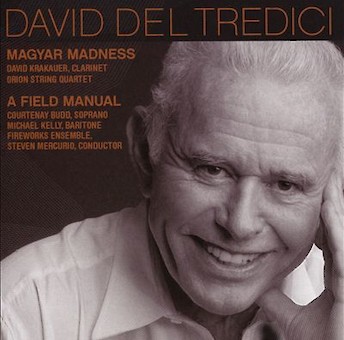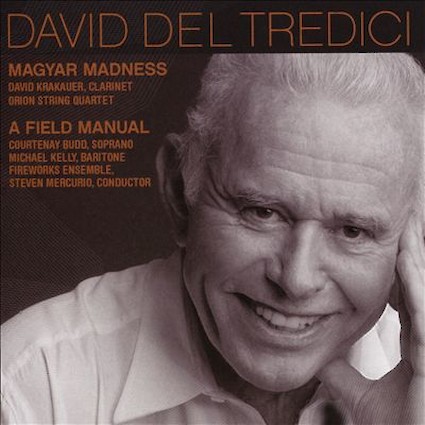Recordings of A Field Manual and Magyar Madness issued by e-one
4/15/2016
Written for Fireworks, A Field Manual is rife with verbal pyrotechnics — the poetry of Edward Field. This cycle of songs is scored for high soprano, baritone and eight instruments — all of which are, in varying degrees, electrified. Jointly commissioned by Fireworks and by "Then & Now," it is dedicated to Fireworks' founder, Brian Coughlin.
What I love about Ed Field's poetry (and about Ed himself) is fearlessness in "going there" — whether to humor, to deep feeling or to explicit sexual expression. His ebullient poetry, at once startling and tender, celebrates a shame-free view of life. After reading a Field poem for the first time, I have often exclaimed "Oh, so you can write about that!" Ed Field gets away with murder, executed with the grace of a master criminal enjoying his poetic license.
Following an Overture, four songs are sung by either the soprano or the baritone, who then join together in the fifth and final song.
Sonia Henie Sonnet is the first song. For those too young to remember, Sonia Henie was, in the 1920's and '30's, an Olympic skating star who went on to become a Hollywood star. Glamorously skating her way through a number of popular movie musicals, she did for skating what Esther Williams would later do for swimming. (Bonus question, kids: Who is Esther Williams?) The song is rather curious in simultaneously juxtaposing two different musics in two different rhythms. The one, a fast fugue in 2/2 meter, is crossed by another — a "cracked" version of the Skater's Waltz in 3/4 time. The soprano line soars into the realm of Mozart's Queen of the Night — my Queen of the Ice?
Old Acquaintance, sung by the baritone, comes next. We would be shocked by this poem, were we not seduced by Ed Field's characteristic charm. Can a poem really be written entirely about one's "member"? And be sung in public? In early rehearsals, the baritone Chris Trakas confided, "David, I can't believe I'm going to be singing about my 'willy'!" The song is fast and pulsing, with ever-mounting vigor.
Inevitably, petit mort must follow. The Book of Sorrow, likewise sung by the baritone, stands in utter contrast to the preceding song. The mood now is resignation and loneliness, with a barcarolle-like rhythm, slowly oscillating in 12/8.
The soprano's ensuing Beside a Pool is a short poem with a political edge (signaled by a sudden appearance of the National Anthem). Like the many fishy creatures inhabiting the text, the music glitters and skitters around, chased by another of the soprano's high-flying vocal lines.
Sweet Gwendolyn's Tale is the concluding duet. Considerably longer than the others, this "song" is more in the nature of a dramatic scena that is simultaneously both humorous and appalling. Poetically, this is a return to the sexually explicit Field — an S/M tale of seduction between two women, one high-born and "bad" (the countess), the other innocent and, of course, "good" (sweet Gwendolyn). As the events become more graphically detailed, the music suddenly quotes from Wagner's Parsifal. Amfortas's wound-motive appears when the countess begins her rape of the young innocent; at a later point (the violation having been completed), the so-called "Dresden Amen" is intoned, symbolizing the "purity" — now lost forever — of the "sweet," "poor," "foolish" girl. The song's end brings a reprise of the scene's opening music, expanding now into a triumphant coda — a triumph, alas, of "evil" over "good"!
I. Sonja Henie Sonnet (soprano)
In high school we danced the lindy white-style
like Sonja Henie on her skates
curvetting her way around the rinky-dink
back-first, front-first, leaving a trail of scars.
Splitting in air or dissolving in a spin
she came out holding her muff to cheeks
dimpled and rosy under Bo-Peep bonnet
as snowflakes starred her blond and marcelled head,
and curtsying, her little behind
peek-a-booed under fluffy skirt
when she braked to a stop before the cameras
in a cloud of powdery ice.
Below, blunt feet in leather with blades of steel
dug in their points and held.
II. Old Acquaintance (baritone)
Old friend, we’ve come through
in pretty good shape, so far,
better, in fact,
than during those angst-filled years
when you wrecked my life
and I wrecked yours. Remember?
But, back then, we didn’t appreciate each other,
did we—like an ill-matched couple,
a bad job by an incompetent marriage broker,
or who just got married out of general horniness
rather than any real compatibility.
I never liked your looks or your size
and you had ideas of your own
I couldn’t figure out,
though I responded to your goading
and roamed the nights away.
My God, what you led me into,
and I got you into some pretty tight fixes myself.
Life is less strenuous now.
In our golden years, you make few demands.
We’ve both come to like a bit of a wank,
with none of the old recriminations after.
And I’ve even learned to admire,
as I pose in the mirror,
your silky length,
respect your sulky independence.
I wonder that I ever thought you
insufficient, myself under-endowed—
or else you’ve grown.
Best of all, I’m impressed
by how good we look together—
the proportions seem just right.
So, Good Cock,
dick, prick, dong,
lul, bite, schwantz,
wang, willie, weenie,
and all your other names,
if you’ve a mind to, now,
and I’d say you’ve earned it,
stand up, old friend, with me
and take a bow.
III. The Book of Sorrow (baritone)
This notebook, empty.
What shall be written in it?
It is waiting for the words of pain,
the life to come without my dear one.
The record of a wanderer without a home.
So many pages and each
a day of loneliness.
How long can this go on?
After this book is filled
there will be another, and another,
and another…
The story of my life.
IV. Beside a Pool (soprano)
In the pool
there are polliwogs
so there must be something else here,
something that eats polliwogs,
or maybe nothing bothers to eat polliwogs.
Come on, you know something is eating those polliwogs.
Nothing’s too insignificant to be eaten,
like who’d think anyone would bother
to eat sunflower seeds—you crack
and there’s hardly anything there
but a mouthful of shells.
Still, half the world is seed-eaters
and the other half lives off the seed-eaters,
those innocents. Really,
you have to be half-innocent at least
to eat seeds by the hour.
I sit here by the pool where the polliwogs wiggle
and tiny ants are eating me
not to speak of landlord, government, gnats, and devils:
Nobody’s too insignificant to be eaten.
V. The Countess and Sweet Gwendolyn's Tale (soprano and baritone)
[This is the sad tale of sweet Gwendolyn and the Countess in her black and
dirty leather. Foolish poor Gwendolyn, dreadful Countess]*
The Countess rode out on her black horse in spring
wearing her black leather riding costume.
She was scouting for disciples in the countryside
and flicked with her whip the rosebuds as she passed.
Sweet Gwendolyn in her white dress
was out gathering May flowers.
Under sunshade hat, her pale face
blushed to the singing bees,
and her golden curls lay passive on bent shoulders
as she stooped to pluck a white lily.
The Countess passing by took one look,
galloped up, and reined her stallion sharply in,
high over the modest figure
of Sweet Gwendolyn with the downcast eyes.
She leaped down from her horse and knelt,
laying the whip in tribute before the golden girl.
That foolish one swooned forward to the ground
in a great white puff of dress fabric
and a scattering of flowers. At that,
the Countess rose in all her black pride
and put her dirty leather boot on Gwendolyn’s bent neck,
pushing down the golden head to the grass,
and gave her a smart lash across her innocently upturned behind.
Gwendolyn looked up with begging eyes
and a small whimper of submission,
as the Countess pushed her over and threw the skirt up,
exposing legs and bottom bare,
and shoved the leather whip handle between squeezed thighs of virtue
forcing them apart to reveal the pink pulsing maidenhood.
Foolish Gwendolyn for not wearing panties
but how could she have known what was in store?
Her skirt fell over her head like petals of a fully-opened flower
and her legs waved in the air like stamen and pistil,
inviting the bee of the Countess’s tongue
to slip in and sip nectar in the golden fuzz.
Poor Gwendolyn moaned with shame and pain
as she lay back crushing her May flowers, exposed and unresisting—
until the Countess, in full charge, pulled her to her feet,
tied the whip end around her neck,
remounted the big black horse
and slowly trotted off,
leading the sobbing girl a captive behind her
off to her dark castle.



World premiere recordings